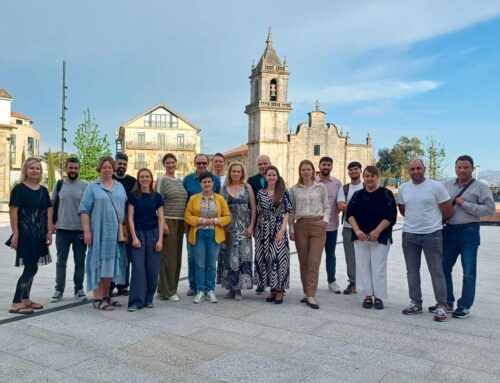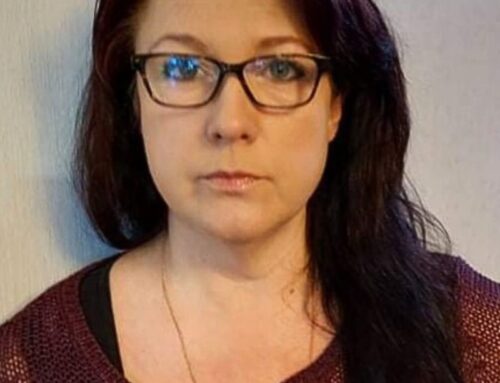“Disseminating the importance of Rural Energy Communities require listening and empathy”
With this interview to Almudena Fiunte, EC4RURAL technician, we deep into the field work that is carrying out with the citizens of 22 Galician municipalities participating in our project. The change of opinion is remarkable and meaningful, she explains, when she ‘’translates’’ the technical complexity of the Rural Energy Communities into a simple and accessible language.
Almudena, what is your role in the EC4RURAL project?
As an EC4RURAL technician, my role is to integrate both technical and social perspectives. From the technical part, I work in the Rural Energy Community (REC) study. Starting from the diagnosis that analyses the energetic power of the 22 Galician municipalities, I elaborate procedures and action plans adapted to each territory to facilitate the REC implementation.
From the social part, I maintain direct contact with the municipalities, the Rural Development Groups (RDG) and citizens. I work by dynamising the process through collaborative meetings between key actors, ensuring democratic participation of the citizens. The balance between the technical and social aspects is what ensures that this energy model can last and improve the quality of life in rural areas.
In an international project of these characteristics, how do you manage the teamwork with the technicians of the partner entities? What is the planning or coordination like?
Coordination in an international project like EC4RURAL requires good communication and planning. We use daily tools that allow us to track tasks and share documentation in real time, which is essential when working with teams from different countries. We hold regular meetings to review progress and ensure that all parties are aligned with the project objectives. The key is to be flexible and adaptable, without losing focus.
You are the liaison of EC4RURAL with 22 Galician municipalities that are part of the pilot in Galicia, how is the field work being done to reach out to the community?
The field work is proving to be an enriching experience. It is essential to reach out to the public, as the Rural Energy Communities represent not only a technical change, but also a transformation of the community.
Through meetings with citizens and local authorities, we promote the understanding of Rural Energy Communities and the benefits they bring. It is natural for there to be some initial scepticism or lack of understanding, but by addressing the issues of reduced electricity bills, self-sufficiency and energy transition, community engagement increases significantly. This connection with people and the ability to address their concerns is key to fostering a sense of belonging and commitment to RECs.
“Reaching out to the local community is vital as the Rural Energy Communities represent a transformation of the community.”
What was, or is, your greatest challenge? And your greatest obstacle?
My biggest challenge is to translate the technical complexity of the Rural Energy Communities into a simple and accessible language. The technical information surrounding these initiatives can be difficult to understand, so the challenge is to present it to the public in a clear and attractive way, so that they can fully understand and visualise all the benefits.
The challenge is to create real commitment among all stakeholders. Convincing everyone in society of the importance and benefits of Rural Energy Communities requires listening and empathy. The aim is to make all parties feel involved and motivated to contribute to the initiative, overcoming barriers of mistrust and fostering an atmosphere of collaboration.
In general, was there any knowledge about Rural Energy Communities among the local population? What are their biggest doubts?
In many cases, the concept of Rural Energy Communities was unknown or unfamiliar. Most people were unaware that they could generate and share their own energy at a local level. Their main concerns relate to the technical operation, the impact on their electricity bills, the provision of roof space for photovoltaic installations, or the initial costs. They are also concerned about long-term viability and how any technical problems will be resolved.
And when we talk about expectations and the future, what do people value most about the benefits of this new energy model?
What people value most is the opportunity to reduce their dependence on large electricity companies and to save on electricity bills. They also see the environmental impact of this model as very positive, as it generates clean, local energy. Energy self-sufficiency, together with a sense of community and cooperation, is another aspect that is highly valued by local people, especially in rural areas where there is a strong sense of solidarity. The idea that citizens can be part of such a significant change is something that creates excitement and expectations of improvement in the long term.
Bio
Almudena Fiunte, graduate in Social Education from the University of Santiago de Compostela, with additional training in a Masters in Equality, Gender and Education and another in Agroecology: an approach to rural sustainability from the International University of Andalusia.
Throughout her professional career, Almudena has developed expertise in the fields of social education and equality. One of her main areas of focus is social empowerment, where she works to strengthen communities by promoting both personal and collective development. In this regard, she has participated in programmes aimed at improving social skills in various contexts, fostering active and collaborative participation. Additionally, she integrates strategies for environmental education and emotional intelligence to raise public awareness.
Her experience also includes supporting vulnerable children, where she designed educational intervention processes to provide emotional support, enhance self-esteem, and foster resilience. Furthermore, she has training and experience in family mediation, helping to resolve conflicts and promote understanding in complex situations.
She is also involved in projects related to food sovereignty and rural empowerment, as well as actively engaging in ecofeminist initiatives and efforts to combat the climate emergency.






